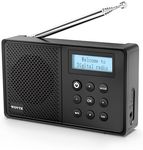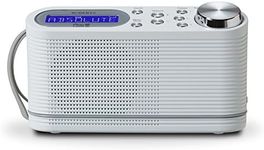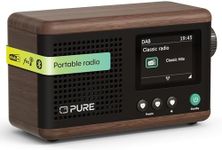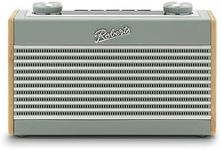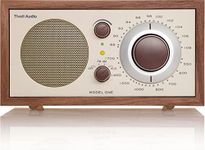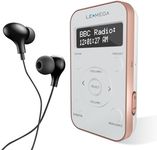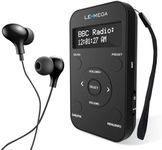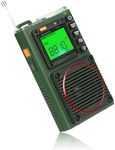Buying Guide for the Best Pocket Radios
Pocket radios are compact and portable devices that allow you to listen to AM/FM radio stations on the go. They are perfect for those who enjoy listening to music, news, or talk shows without relying on streaming services or internet connectivity. When choosing a pocket radio, it's important to consider factors such as sound quality, battery life, and ease of use to ensure you get the best experience for your needs.Sound QualitySound quality in pocket radios is crucial as it determines how clear and enjoyable the audio output will be. This is influenced by the radio's speaker size and quality, as well as its ability to pick up signals clearly. Generally, larger speakers tend to produce better sound, but in pocket radios, the size is limited. Look for radios with good reviews on sound clarity and volume. If you plan to use the radio in noisy environments, consider one with a headphone jack for private listening.
Tuning MethodThe tuning method refers to how you select radio stations. There are typically two types: analog and digital. Analog tuning involves a manual dial to find stations, which can be less precise but offers a nostalgic feel. Digital tuning allows for more precise station selection and often includes features like preset stations. If you prefer ease of use and accuracy, digital tuning might be the better choice. However, if you enjoy the traditional experience, analog could be more appealing.
Battery LifeBattery life is important for pocket radios as it determines how long you can use the device before needing to recharge or replace batteries. Some radios use disposable batteries, while others have rechargeable ones. Consider how often you'll use the radio and whether you'll have easy access to power sources. For frequent use, a radio with long battery life or rechargeable batteries might be more convenient. If you use it occasionally, disposable batteries could suffice.
Size and PortabilityThe size and portability of a pocket radio are key factors since the main advantage of these devices is their compactness. Smaller radios are easier to carry around and fit into pockets or bags. However, very small radios might compromise on sound quality or battery life. Consider where and how you'll be using the radio. If you need something ultra-portable, go for a smaller size, but if you can afford a bit more space, a slightly larger radio might offer better features.
DurabilityDurability refers to how well the radio can withstand everyday use, including drops or exposure to elements like dust and moisture. Some pocket radios are designed to be more rugged, with features like shock resistance or water resistance. If you plan to use the radio outdoors or in environments where it might get knocked around, look for a model with these protective features. For indoor or gentle use, standard durability should be sufficient.
Additional FeaturesAdditional features can enhance the functionality of a pocket radio. These might include a built-in flashlight, alarm clock, or Bluetooth connectivity. Consider what extra features might be useful for your lifestyle. For example, a flashlight could be handy for outdoor use, while Bluetooth connectivity allows you to use the radio as a speaker for your phone. Think about your typical use scenarios and choose a radio with features that will add value to your experience.


